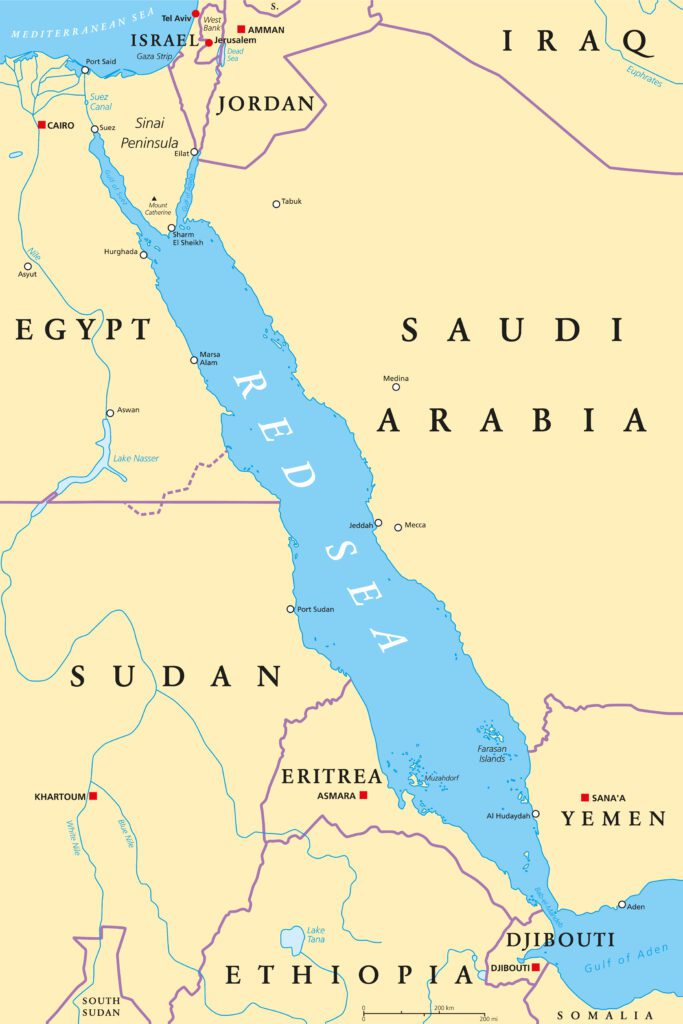
Demonstrators, one with a portrait of Houthi leader Abdul Malik al-Houthi, shout slogans during a march in solidarity with the people of Gaza in the Houthi-controlled capital Sanaa on January 5, 2024.
Photo: MOHAMMED HUWAIS / AFP
The U.S. and United Kingdom have launched strikes from the air and sea against Houthi military targets in Yemen, in retaliation for attacks on shipping in the Red Sea.
“These targeted strikes are a clear message that the United States and our partners will not tolerate attacks on our personnel or allow hostile actors to imperil freedom of navigation,” U.S. President Joe Biden said in a statement. British Prime Minister Rishi Sunak said the strikes were “necessary and proportionate.”
Friday’s strikes targeted an airbase, airports, and a military camp, intended to take out Houthi drones, missiles, coastal radar, and air surveillance. A Houthi spokesperson said 73 strikes had killed five of the group’s fighters and wounded six others. The attacks would not go “unpunished” and the group will continue to target ships headed for Israel, he said.
The Houthis have been attacking ships in the Red Sea since October, forcing some shipping companies to reroute vessels around the Horn of Africa. They say their assaults are aimed at stopping Israel’s war on Hamas in Gaza, but according to news reports, their targets increasingly have little or no connection to Israel.
Aerial footage shows moment British jets strike Houthi military targets
— Sky News (@SkyNews) January 12, 2024
Read more🔗https://t.co/R5vfTxxTRu
Transit through the Red Sea is a crucial shipping lane, with about 12% of the world’s trade typically passing through the waterway. The United States and its allies have deployed a naval task force to the area to protect shipping, and U.S. and British warships shot down 21 drones and missiles on Tuesday to repel the biggest Houthi attack to date.
Prior to Friday’s strikes, the Houthis were warned that their aggression would have consequences.
However, Houthi spokesman Mohammed Abdulsalam maintained on Friday that there was “no justification for this aggression against Yemen”, and that there are no threats to any vessels apart from “Israeli ships or those heading to the ports of occupied Palestine.”

The Houthi movement is a Shia Islamist military movement inspired by Hezbollah and supported by Iran. The rebels have controlled a major part of Yemen since the outbreak of civil war in 2014 and are part of a regional Iran-backed “axis of resistance” against Israel and its supporters.
The U.S. has accused Iran of trying to destabilise the Middle East through its military allies, like Hamas in Gaza, Hezbollah in Lebanon and the Houthis in Yemen. The October 7th pogrom against Israel led by Palestinian terrorist group Hamas was reputedly orchestrated by Iran. Frequent cross-border gunfire and rocket attacks involving Israel and Hezbollah have followed.
The White House said Iran has been “deeply involved” in the planning of Houthi aggression against commercial vessels in the Red Sea, with Tehran providing the rebels with weapons, funding, training, and “tactical intelligence”. Tehran has said it supports the Houthis politically but denies arming the group. By backing the October 7 Hamas onslaught, Iran’s rulers aimed to derail Saudi Arabia’s attempts to normalise its relations with Israel.
According to an analysis by the Washington-based Middle East Institute, Iranian funding and training of Houthi militants was stepped up when Saudi Arabia and the United Arab Emirates intervened in the Yemeni civil war in 2015 by backing the anti-Houthi Yemeni state forces. Over time, the Houthis managed to exhaust Riyadh into seeking withdrawal from Yemen. Diplomatic tensions within the Gulf Cooperation Council had increased sharply. Accordingly, a ceasefire between the Houthis and the Saudis has been in place since April 2022.
The Houthi movement’s attacks on Red Sea shipping and the U.S.-British counterstrikes could lead to wider military escalation in the region. Russia requested an urgent meeting of the U.N. Security Council. Kremlin spokesman Dmitry Peskov called the counterstrikes “from the point of view of international law … illegitimate.” China said it was “concerned about the escalation of tensions.” Saudi Arabia called for “self-restraint and avoiding escalation.” Iran’s foreign ministry said that the Western action “will have no result other than fuelling insecurity and instability in the region.”
More than 20 nations—including the United Kingdom, Denmark, Germany, Greece, the Netherlands, and Norway—are already participating in a U.S.-led naval mission to increase maritime protection in the Red Sea. Many European nations have refused to place their naval forces under the direct command of Washington, and according to a document seen by Politico, the European Union wants to send at least three warships to safeguard vessels in the Red Sea.
In a written reply to The European Conservative, Peter Stano, the European Commission’s Lead Spokesman for Foreign Affairs and Security Policy stated:
As a general rule we do not comment on media reports about alleged leaks. The process of proposing, discussing and agreeing any EU mission is a confidential one and not supposed to be carried out in the open. In the case of a possible EU mission in the Red Sea, I can only state that the process has started, but we will not be commenting [on] its various stages and exchanges with member states since all this is confidential until the moment of adopting a decision.
